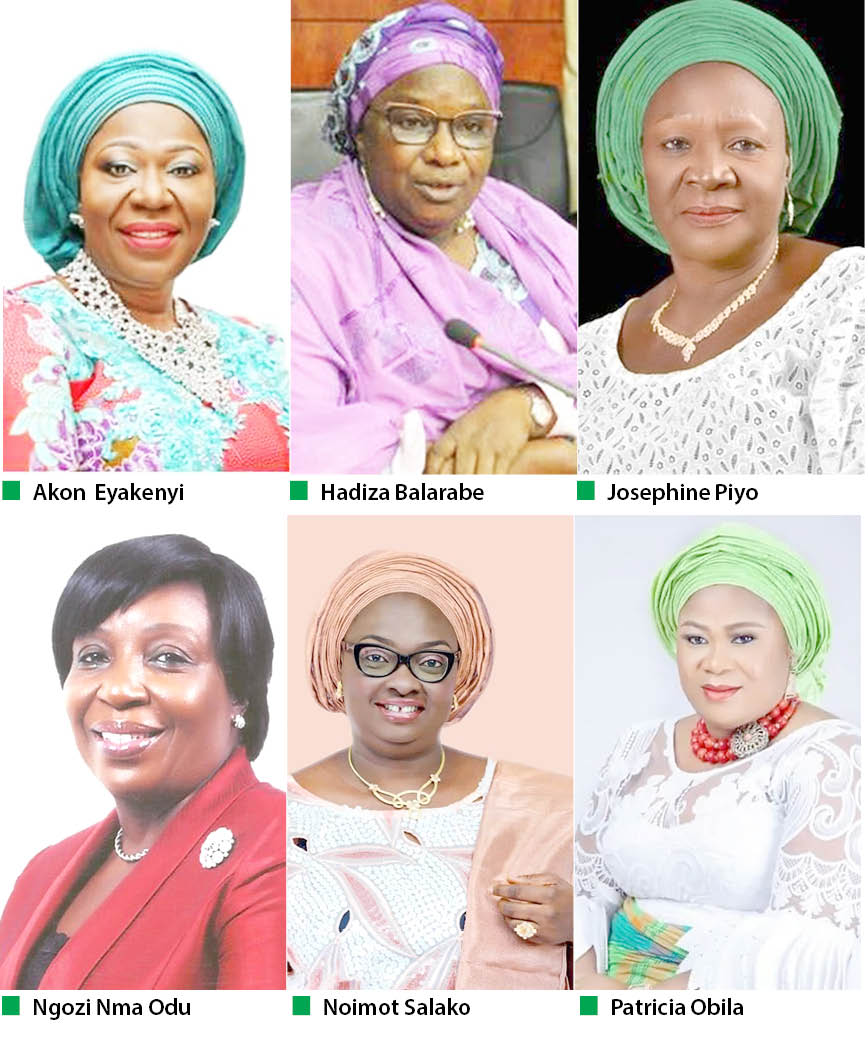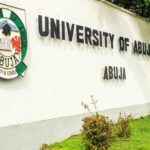By Dana Daniel Zagi (Abuja), Iniabasi Umo (Uyo), Victor Edozie (Port Harcourt), Peter Moses (Abeokuta), Nabob Ogbonna (Abakaliki) & Mohammed Ibrahim Yaba (Kaduna)
Out of the 24 female deputy governorship candidates in 15 states that made it to the ballot to contest alongside their male governorship candidates, six were elected according to the March 18 governorship election results announced by the Independent National Electoral Commission (INEC).
In the 28 states where governorship elections were conducted in the country, 15 of these states had female deputy governorship candidates in one or more political parties, bringing the total number of female deputy governorship candidates on the ballot to 24.
Though result from two of the 28 states -Adamawa and Kebbi, was declared inconclusive, results from 26 states have been announced by the INEC. Meanwhile, INEC has scheduled supplementary elections in Kebbi and Adamawa states for April 15, 2023.
In this report, Daily Trust on Sunday profiles the six female deputy governors-elect.
In the 19 states of the North, two states – Kaduna and Plateau – have female deputy governors-elect.
Party crisis: How PDP, APC national chairmen lost their seats since 1999
10th NASS: Jigawa, Kwara reps join speakership race
Dr Hadiza Balarabe Sabuwa (Kaduna)
Hadiza Sabuwa Balarabe is a politician and trained medical doctor who has been the deputy governor of Kaduna State since 2019. She is the first elected female deputy governor of the state and was elected during the 2019 Governorship Election alongside her principal Governor El’Rufia, under the platform of the ruling All Progressives Congress APC.
She was born into the family of Alhaji Abubakar Balarabe in Sanga Local Government Area of the state.
Hadiza attended Girls College Soba for her secondary education, she then got admission into the University of Maiduguri to study medicine and graduated with MBBS in 1986.
She also served as the Executive Secretary of the State Primary Health Care Development Agency before becoming the deputy governor to Nasir El-rufai in 2018.
Hadiza Sabuwa Balarabe received her certificate of return from INEC alongside the Governor-Elect Senator Uba Sani on Friday.
Josephine Piyo (Plateau)
Mrs Josephine Piyo is the deputy governor-elect of Plateau State. She contested on the platform of the Peoples Democratic Party (PDP) alongside Governor-elect Caleb Mutfwang.
Piyo, a grassroots politician and one time chairperson of Riyom Local Government Area of the state, was also a former lawmaker in the Plateau State House of Assembly.
Mutfwang said the choice of Piyo was about giving voice to the voiceless.
Piyo is a health care worker and had served as a public administrator before her foray into politics.
In the South South zone of the country, two females emerged as deputy governors-elect.
Dr Akon Eyakenyi (Akwa Ibom)
Dr Akon Etim Eyakenyi is the deputy governor-elect of Akwa Ibom State under the platform of the PDP.
Eyakenyi, who is the Senator representing Akwa Ibom South in the National Assembly, is currently the Vice Chairman Senate Committee on Education.
She started her political career in 2000, as Commissioner for Industry, Commerce and Tourism during the tenure of Obong Victor Attah.
In 2013, she was appointed Chairperson, Akwa Ibom State Technical Schools Board, by former Governor Godswill Akpabio, and then as Minister of Lands, Housing and Urban Development in 2014 during the tenure of President Goodluck Jonathan.
In June 2015, Dr. Eyakenyi was appointed into the Technical Committee of the Ibaka Deep Seaport, and in October 2016, as Chairman, Governing Council, Akwa Ibom State Polytechnic, Ikot Osurua.
She is a mother and wife, and married to Engr. Etim Eyakenyi, an indigene of Iquita in Oron Local Government Area.
Dr Ngozi Nma Odu (Rivers)
Dr Ngozi Nma Odu is Professor of Food and Public Health Microbiology at the PAMO University of Medical Sciences, Port Harcourt. Professor Odu had also served the University of Port Harcourt both as a lecturer in the Department of Microbiology and as the first Acting Executive Director of the University of Port Harcourt Foundation. She is also a visiting professor to the Rivers State University.
As a civil servant in the state, she rose through the ranks in the Rivers State Ministry of Health to the post of permanent secretary, a post she held for six and half years (1999 – 2006), making her the longest serving Permanent Secretary in that Ministry.
She had served her country in various ways. She reviewed 3 chapters of the 2004 (2nd Edition) of the National Health Policy of Nigeria. She co-reviewed the 2004 – 2007 Health Sector Reform Programme of the FMOH. She also appraised the Public Private Partnership (PPP) implementation on the health sector in Akwa Ibom State in 2005. She produced the draft State Strategic Health Development Plan (SSHDP) for Bayelsa State in 2009 as a consultant to the FMOH. She has served as a consultant to SPDC, TOTAL, NLNG and UNDP.
In the South West, only one female deputy governor-elect emerged from the just concluded governorship election.
Engr Noimot Salako Oyedele (Ogun)
Engr Noimot Salako-Oyedele is the serving and Deputy Governor-elect in Ogun State. She was the only female deputy governor in the South West before last year’s election of Governor Biodun Oyebanji of Ekiti State, who has a female Deputy, Mrs Christianah Afuye.
Salako-Oyedele was born in 1967 to the family of Late Professor Lateef A. Salako, in Ado Odo Ota Local Government of Ogun State.
As an engineer, she has over 30 years experience in the Consulting, Contracting And Real Estate sectors.
She has been on the board of several companies in Nigeria and the United Kingdom, and currently serves as the Chief Executive Officer of Glenwood Property Development Company Limited.
She holds a masters degree in Public Health Engineering from the Imperial College of Science & Technology London, and a Bachelor of Science degree in Civil Engineering from the University of Lagos.
Salako-Oyedele became the third female deputy governor of the state following the election of Governor Dapo Abiodun in 2019. She was re-nominated and won the second term election with Abiodun during the March 18 election.
In the South East, Ebonyi State is the only state with a female deputy governor elect.
Patricia Obila (Ebonyi)
Mrs Patricia Obila was a two-term Vice Chairman of Afikpo North LGA of the state. Obila, on her nomination as running mate to the governor-elect, Hon Francis Ogbonnaya Nwifuru, was described as a graduate with impeccable experience in leadership.
They won on the platform of the All Progressives Congress (APC).
Daily Trust on Sunday reports that female deputy governors in the country dates back to the military regime in 1990, when General Ibrahim Babangida appointed two female deputy governors in Lagos and Kaduna states.
In Lagos State, Modupe Okunnu was the first female deputy governor who served under the administration of Brigadier General Raji Rasaki (rtd).
In the same year, Aisha Pamela Sadauki was appointed deputy governor in Kaduna State under the administration of Abubakar Tanko Ayuba (rtd).
Since then, women have served as deputy governors in several states, though none has been elected governor yet. States like Lagos, Osun, Ogun, Ekiti, Anambra, Plateau, Kaduna are among states that have had female deputy governors.
Currently, only four states have female deputies in the country. They are Cecilia Ezeilo in Enugu State; Hadiza Balarabe in Kaduna; Noimot Salako-Oyedele in Ogun State and Ipalibo Gogo in Rivers State.
Though states with female deputy governors continue to increase in the southern part of the country, the north is still lagging behind in that regard.
Professor Kamilu Sani Fagge, a political analyst from the Bayero University Kano, said tradition and religion are among the factors affecting the political engagement of women in the north.
He said “We have an African tradition that women are not visible in public sectors which tends to give more roles to men, and this gives the women some kind of psychological inferiority that prevents them from coming out to contest. They would rather want to be given certain quotas,” he said.




